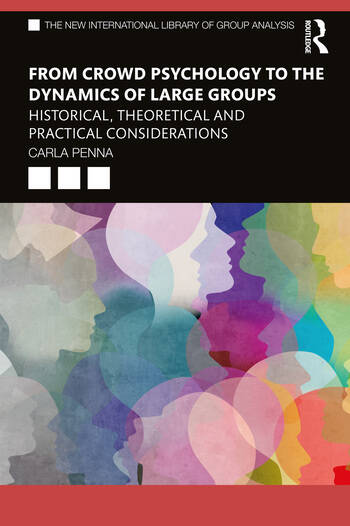From Crowd Psychology to the Dynamics of Large Groups: Historical, Theoretical and Practical Considerations

Book Details
- Publisher : Routledge
- Published : 2022
- Cover : Paperback
- Pages : 254
- Category :
Group Psychotherapy - Catalogue No : 96634
- ISBN 13 : 9780367024505
- ISBN 10 : 9780367024
Reviews and Endorsements
"Carla Penna takes us on a journey through centuries of thought about persons who are both social beings as well as sentient ones. Her book is more than a set of reflections, as it comprises a comprehensive survey of the political and sociological nature of groups, communities and societies. It then considers the various contemporary forms of therapy in groups. We are invited to see how social theorists such as Kurt Lewin or Norbert Elias contributed to therapeutic thinking, whilst therapeutic practice has informed sociological thinking. This multi-dimensional picture shows humans beings within the matrix of the societies which humans have created, and how that matrix can heal us as well as form us." - R.D. Hinshelwood, Psychiatrist, Psychoanalyst, Professor for Psychoanalysis, University of Essex.
"At last a helpful and scholarly account of the theoretical history of Large Group Theory. The book is to be recommended for forging a link between sociology, psychoanalysis and up to date group analysis. Readers are left in no doubt that large group phenomena can only be comprehended in an inter-disciplinary way and that there are more ways than one to look at human gatherings in large numbers." - Gerhard Wilke is a group analyst and an independent organizational consultant in London. He is an Associate of the Ashridge Business School.
"The Crowd is an essential addition to the literature on how to understand, and live with, the demands of our troubled times. Moving with great clarity and energy through the history of hordes, herds, masses, and crowds, and drawing from her deep understanding of group psychologies and group analysis, Carla Penna offers both a balanced and well-informed guide to group theory and a set of innovative ideas for confronting social and psychological reality." - Stephen Frosh, PhD, Professor of Psychosocial Studies, Birkbeck, University of London.
"Carla Penna's book From Crowd Psychology to the Dynamics of Large Groups: Historical, Theoretical and Practical Considerations is a monumental research project. The book is rich with facts and ideas, describing the development of the concept of the crowd, the birth of the work of Bion (the Tavistock Institute) and Foulkes (Group Analysis), the unstructured psychodynamic Large Group, Unconscious Social Processes, and Hopper's 4th Basic assumption of Incohesion. Penna integrates sociology, psychology, and group analysis in a very fluent and smooth way. Her historical research is broad and reveals many important facts from the end of the 19th century until today. This breadth is breathtaking. In today's world, at the beginning of the third decade of the 21th century, flooded by social conflicts, polarization, divisiveness, and mass impact of social media, this book is essential in order to understand the large social group unconscious processes. Its perspective allows the reader to take some distance from current political, sociological and cultural crises and to look at them from a wider angle. This book is highly recommended for sociologists, historians, psychologists, psychotherapists, group therapists, group analysts, and anyone who is interested in understanding more about unconscious social processes." - Haim Weinberg, PhD is a psychologist and group analyst in California and Israel. Past president of the Israeli Association for Group Psychotherapy. Former Director of International Programs at the Professional School of Psychology, California.
"Carla Penna puts at our disposition her encyclopedic knowledge on phenomena involving large numbers of persons. She approaches the context of masses with psychoanalytic and group analytic tools, first "mapping the field" of the unconscious life of crowds, illuminating the darkness of the twenty-first century crowds and masses." - Robi Friedman, PhD, group analyst, Past President of the Group Analytic Society International

